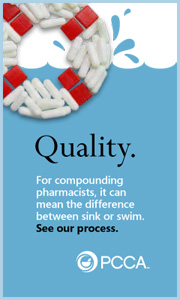|
FDA Inspections of Some Compounding Pharmacies
Six months after a U.S. meningitis outbreak that killed 51 people put the spotlight on specialty pharmacies, the FDA has uncovered a wide range of shortcomings, including failure to set or follow procedures to prevent contamination, inappropriate protection worn by people working in sanitary areas, and inadequate testing to determine expiration dates, a review of 30 inspection reports shows. The reports covered inspections from January through March; the unprecedented number of publicly released inspection reports, known as form 483s, may be used as a tool by the FDA in its quest to gain authority over the industry. "It's very aggressive on the part of the FDA," said Sarah Sellers, a former agency compliance officer who now works for the drugmaker Ther-Rx Corp., which sells a maternity medication threatened by compounding competition. "Without this information the FDA would not be able to move forward with new legislation. We've identified that there's an absolute and critical need for greater oversight."
http://www.bloomberg.com/news/2013-04-05/drug-compounders-fail-to-learn-lesson-as-fda-boosts-raids.html
Woburn Pharmacy May Discontinue Compounding Making Sterile Injections
The owner of a Woburn specialty pharmacy that recalled two dozen drugs after the discovery of unidentified contaminants told regulators Tuesday that he was uncertain whether he would continue compounding sterile injectable medications and eye solutions. This was the first public appearance since last month's recall for James Nahill, owner of Pallimed Solutions Inc.; he testified for more than two hours before the Massachusetts Board of Registration in Pharmacy about three problems found earlier.
http://bostonglobe.com/lifestyle/health-wellness/2013/04/02/compounding-pharmacy-recall-left-children-hospital-patients-without-antibiotic-solution/ooKdinObEpxFf2QqUk2CSO/story.html
Compounding Pharmacies Role in Drug Shortages Initiate Debates
Continuing drug shortages have led healthcare providers, pharmacists, and others to debate the role of compounding pharmacies as alternative sources of drugs in short supply. The National Community Pharmacists Association urged the FDA to "preserve the role" of compounders in providing access to scarce drugs. Public Citizen took the opposite stance arguing that allowing patients to use those drugs puts them at a safety risk.
Drug shortages have steadily increased in recent years. There were 204 new drug shortages in 2012, a slight decrease from the record 267 new shortages reported in 2011, but almost triple the number of new shortages that occurred in 2006, according to the University of Utah Drug Information Service.
Editor's note: The ASHP drug shortage list currently contains 242 drugs in short supply.
http://www.modernhealthcare.com/article/20130403/NEWS/304039965/drug-shortages-spur-debate-over-role-of-compounding-pharmacies
Safe Solution for Rx Supply Chain
Three times this past year the FDA has issued warnings that counterfeit cancer drugs originating overseas infiltrated the U.S. pharmaceutical supply chain, putting patients at risk. While the U.S. is fortunate to have one of the safest and strongest pharmaceutical supply chains in the world, we are still vulnerable within the supply chain and the need to remain vigilant to safeguard the lifesaving and life-enhancing pharmaceuticals that benefit every American.
http://www.politico.com/story/2013/04/a-safe-solution-for-rx-supply-chain-89549.html
UPS to 'Forfeit' $40M Collected from Online Pharmacies
UPS has agreed to pay $40 million to terminate a federal criminal probe connected to its delivery work for online pharmacies. The Department of Justice also stated that the Atlanta-based company would also "take steps" to block illicit online drug dealers from using their delivery service. The fine amount is the money UPS collected from suspect online pharmacies. In addition, UPS won't be charged with any crimes; it should also be noted that FedEx has also been a target of the federal investigation.
http://www.startribune.com/nation/200618731.html
India Gains in Landmark Cancer Drug Patent Case
India's top court dismissed Novartis AG's attempt to win patent protection for its cancer drug Glivec; this is a blow to Western pharmaceutical firms targeting India to drive sales and a victory for local makers of cheap generics. This benchmark decision for intellectual property cases in India does not bode well for foreign firms engaged in ongoing disputes in India, including Pfizer Inc. and Roche Holding AG.
This reinforces the role of local companies as suppliers of inexpensive generics to India's rapidly growing $13 billion-a-year drugs market and also across the developing world. India's Cipla Ltd. and Natco Pharma Ltd. will benefit from the decision, as they already sell generic Glivec in India at around one-tenth of the price of the branded drug.
http://www.reuters.com/article/2013/04/01/india-novartis-patent-idUSL3N0CO0RR20130401
Hospira Recalls Sodium Chloride After Copper Particles Found
Hospira has issued yet another recall, at least its fourth this year. The company continues to struggle to meet FDA expectations at its key sterile injectables plant. The plant has been an ongoing source of problems for the company. Copper particles were found in a 1000-mL flexible container of its 0.9% sodium chloride injection, a product used as a source of water and electrolytes; tests found that the particles contained copper, zinc, and lead. Hospira is the largest maker of generic sterile injectables in the U.S. and has had problems with inspections since 2010.
http://www.fiercepharmamanufacturing.com/story/hospira-recalls-sodium-chloride-after-copper-particles-found/2013-04-01
| 



